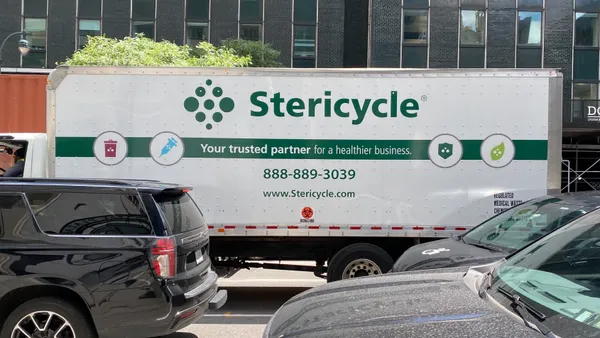UPDATE: May 27, 2020: Boise, Idaho recently announced it will now send stockpiled EnergyBags to an unindentified cement manufacturing facility in Utah, based on preliminary environmental review findings that described this option as having "improved environmental outcomes compared to landfilling."
According to Boise, this move "will be reevaluated once the environmental analysis has completed the peer review process to ensure that the conclusions remain consistent." Material could still return to Renewlogy's Utah facility and be processed via pyrolysis – which the analysis is also using as a comparison – once facility upgrades are complete.
Dive Brief:
- Boise, Idaho's Hefty EnergyBag curbside recycling program has been on hold for a year for upgrades to the Renewlogy facility that processes the plastic materials, and the program now is not expected to resume until later this year. In a news release, the city cited a "new delay" causing the Renewlogy facility in Utah to refrain from accepting materials until the late summer or early fall.
- Some of the equipment for the facility upgrade was supposed to ship from China in January, but it has been delayed because of the coronavirus situation, according to information the Renewlogy and Hefty EnergyBag recycling program partners provided to Waste Dive.
- Boise reports it is working with Reynolds Consumer Products and Dow Chemical Company to identify alternative processing options in the interim such as sending the EnergyBags to cement manufacturing facilities to use the plastics as fuel. The city is waiting to decide next steps "until a life-cycle analysis of the environmental implications of using plastics as a fuel in cement production can be completed."
Dive Insight:
Boise is referring to the newly mentioned late summer or early fall timeframe as a "new delay." Last summer, the city suggested to Waste Dive that necessary upgrades to Renewlogy's facility could be complete by January or February this year. However, at that time Renewlogy indicated to Waste Dive that was a "conservative estimate." Whether the current situation truly is a delay or not might depend on which original timeline is used as a reference point.
Regardless, Boise is looking for other options to recycle the plastics collected from residents amid the uncertainty. Early last year, Boise and other nearby communities were asked not to send materials to the Renewlogy facility until its upgrades are complete. Renewlogy had only been accepting a very limited number of bags to run through upgraded machinery for testing.
Renewlogy says it will be able to increase its processing of flexible plastics with high contamination levels, including the Hefty EnergyBags, once the delayed equipment arrives. Its Salt Lake City, Utah facility still is processing mixed rigid plastics, including those from the program.
Boise did not cease residential collection of the bags even though processing is paused. Public Works previously told Waste Dive that it's important to continue collecting instead of risking customer confusion and difficulty restarting a suspended program. As of last summer, the city was storing two large truckloads — about 40 tons — of bagged plastics until the Renewlogy facility reopens. While the cement option may end up being chosen as a viable alternative, environmental groups have criticized such practices in the past.
While the EnergyBag concept has seen some increased interest in the wake of declining end market options for certain mixed plastics, it still has not been widely adopted. The program was first tested in California in 2014, later moving to cities such as Omaha, Nebraska in 2016. It is now in 13 communities across the United States. Participants put specified plastics into the bag and place them in their recycling bins. The bags are separated from the rest of the stream at MRFs for further processing.










